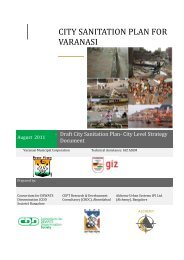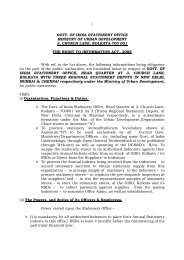CITY SANITATION PLAN - Ministry of Urban Development
CITY SANITATION PLAN - Ministry of Urban Development
CITY SANITATION PLAN - Ministry of Urban Development
You also want an ePaper? Increase the reach of your titles
YUMPU automatically turns print PDFs into web optimized ePapers that Google loves.
<strong>CITY</strong> <strong>SANITATION</strong> <strong>PLAN</strong> BAREILLY<br />
awareness-creation workshops. Regular interaction with slum dwellers, nurturing <strong>of</strong> community leaders,<br />
and continuous monitoring by the CLTS team, made it possible to make all the slums ODF. Strategies<br />
adopted include not providing further subsidy for toilet construction, providing technical support to<br />
slum dwellers on low-cost sanitary toilets, increasing awareness regarding the ill-effects <strong>of</strong> open<br />
defecation, motivating and mobilising communities through participatory methods, using PRA tools and<br />
incentives for community leaders, and awards for clean ward/slum/area/school/class etc.<br />
Key Features<br />
The CLTS programme is community-led and not dependent on external support. It results in sustained<br />
behavior change and builds self-respect, dignity and self-confidence, especially in women. People are<br />
encouraged to build toilets with their own resources, creating ownership and sustained usage. Unlike<br />
free toilets, which are poorly maintained and even abandoned, people are interested in maintaining<br />
these. Proper triggering, facilitation, interaction, motivation and incentives are necessary initially. There<br />
is great potential for replication. Once people realize the need for a behavioral change to maintain<br />
sanitation, and its direct bearing on health, they do it willingly. The CLTS programme methodology<br />
makes people realize the need.<br />
Impact<br />
Kalyani was declared open-defecation free by the state <strong>of</strong> West Bengal on 29 Jan 2009. It got a cash<br />
prize <strong>of</strong> Rs. 25 lakhs to expand and continue its health programme on "Correction Of Anaemia" which is<br />
directly related to open defecation. As a first ODF town in India, Kalyani is much cleaner. Its slums have<br />
benefited not only from sanitation, but also from other developmental works. This is because ODF slums<br />
are given priority for all ULB development works. There is the visible impact <strong>of</strong> the urban poor<br />
recognizing that health is linked to sanitation. Records <strong>of</strong> the health department show a considerable<br />
decrease in gastro-intestinal disorders, and an increased number <strong>of</strong> man-days. Demand has been<br />
generated for more pay-and-use public toilets in Kalyani.<br />
http://www.waterawards.in/2009-winner-pr<strong>of</strong>ile-km.php<br />
ADMINISTRATIVE STAFF COLLEGE OF INDIA, HYDERABAD Page 218
















